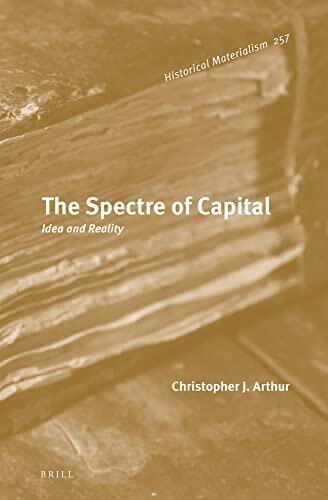
The Spectre of Capital: Idea and Reality
Noch keine Bewertungen
Horror
Format
Gebundene Ausgabe
Seiten
464
Sprache
Englisch
Veröffentlicht
Jul 14, 2022
Verlag
Brill
ISBN-10
9004515178
ISBN-13
9789004515178
Beschreibung
Christopher J. Arthur delves into the intricate relationship between capitalism and its underlying theories in this thought-provoking examination. The work offers an insightful critique of how economic systems shape societal structures and individual experiences, while also exploring the philosophical foundations that give rise to these systems. Through a historical lens, Arthur unravels the complexities of capital, probing the interplay of ideas and material conditions.
The narrative challenges the reader to reconsider the notions of value, exchange, and production within capitalism, revealing how these concepts have evolved over time. By juxtaposing abstract theories with real-world implications, the author highlights the limitations of traditional interpretations that often overlook the dynamic nature of economic forces. The book serves as a call for a deeper understanding of capitalism, suggesting that the material conditions of existence cannot be divorced from the ideas that circulate around them.
Arthur also draws on a broad spectrum of historical and contemporary examples, illustrating how different societies have navigated the specters of capital. This analytical approach encourages readers to engage critically with the ways in which capitalism operates and affects their lives. The richness of the discussion invites reflection on the broader implications of economic theories in shaping human interactions and social structures.
In a landscape where economic discourse often oversimplifies complex realities, Arthur’s work stands out as a significant contribution to the field. His rigorous analysis not only challenges prevailing narratives but also encourages a reevaluation of the relationship between theory and practice, prompting readers to think more deeply about the forces that drive their world. This exploration is essential for anyone seeking to understand the lasting impact of capitalism on society and the individual.
The narrative challenges the reader to reconsider the notions of value, exchange, and production within capitalism, revealing how these concepts have evolved over time. By juxtaposing abstract theories with real-world implications, the author highlights the limitations of traditional interpretations that often overlook the dynamic nature of economic forces. The book serves as a call for a deeper understanding of capitalism, suggesting that the material conditions of existence cannot be divorced from the ideas that circulate around them.
Arthur also draws on a broad spectrum of historical and contemporary examples, illustrating how different societies have navigated the specters of capital. This analytical approach encourages readers to engage critically with the ways in which capitalism operates and affects their lives. The richness of the discussion invites reflection on the broader implications of economic theories in shaping human interactions and social structures.
In a landscape where economic discourse often oversimplifies complex realities, Arthur’s work stands out as a significant contribution to the field. His rigorous analysis not only challenges prevailing narratives but also encourages a reevaluation of the relationship between theory and practice, prompting readers to think more deeply about the forces that drive their world. This exploration is essential for anyone seeking to understand the lasting impact of capitalism on society and the individual.
Rezensionen
Noch keine Rezensionen
Sei der Erste, der dieses Buch rezensiert und deine Gedanken teilt
Erste Rezension hinzufügenLesetagebuch
Keine Lesetagebücher gefunden
Beginne deinen Lese-Fortschritt zu verfolgen, um Log-Einträge hier zu sehen
Füge dein erstes Lesetagebuch hinzuNotizen
Transaktionsprotokoll
Keine Transaktionsprotokolle gefunden
Beginne, deine Buchtransaktionen zu verfolgen, um Log-Einträge hier zu sehen
Fügen Sie Ihr erstes Transaktionsprotokoll hinzu